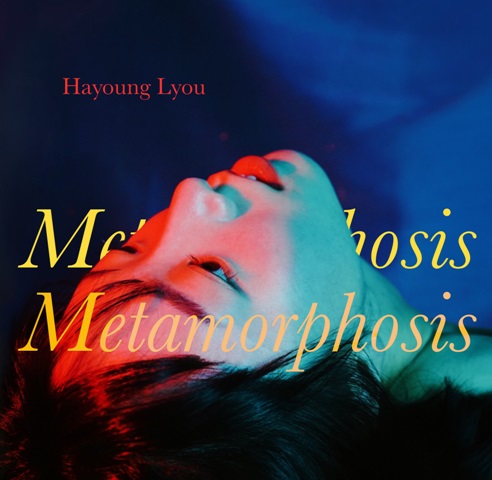
METAMORPHOSIS / LYOU: Reason. Metamorphosis. Animus I. Night Person. Demian. Animus II. Heaven.* Busan. Animus III. Solitude. A Sunny Day at Yankee Stadium / Hayoung Lyou, pno; Jasper Dutz, a-sax/cl/bs-cl; Jacob Shulman, t-sax; Simón Willson, bs; Dayeon Seok, dm; *Wonmi Jung, voc / Endectomorph Music, no number
This CD, scheduled for release on April 17, is pianist Hayoung Lyou’s first as a leader after playing for many years with others. All of the compositions are hers, and as the liner notes indicate, she gave several of these pieces great thought in their creating and naming. Demian is a tribute to a Hermann Hesse novel in which he explains that good and evil are two sides of most people’s natures, and each coexists with the other in different balances.
Although the opening track is soft-grained, it is not music without a backbone. There is a strong pulse to Lyou’s music, even when—as here—the basic meter is constantly shifting. Most of the first 90 seconds are played solely by Jasper Dutz’ bass clarinet with the piano, bass and drums. Lyou then takes a solo accompanied by the bass, with occasional light cymbal touches behind her. Her melodic lines are simple but attractive, and although her solo is not particularly busy it is very meaty and says quite a bit. In short, it is quiet music but not mindless or “ambient” jazz. There’s quite a lot going on here. Dutz’ extended solo is busier and more energetic than Lyou’s, which adds interest to the piece, and Seok’s drums are much busier behind him as he builds to a tremendous climax. When Lyou returns, she brings the quietude back with her.
Metamorphosis, inspired by an Ethan Iverson performance at the Village Vanguard, opens with soft but slightly ominous-sounding bass notes in the piano. Dutz, now on alto sax, and Shulman on tenor then come in for their own discourse, sometimes playing in unison, sometimes in harmony, and sometimes answering each others’ phrases. There is a strong sense of composition in Lyou’s music into which off-the-wall improvisations just do not fit. It is music that is logical and makes sense, but also an incredible flowing feeling. You almost get the mental picture that this music is being washed along on gentle but insistent swirls of water in a stream.
In Animus I, Lyou produces a livelier if no less shifting rhythm, in fact coming to a dead stop before the band moves on to Night Person which is also a lively number. Her music reminds me a little bit of Mingus and a bit of George Russell. I wonder if she counts either of them as influences. Her piano solo here relies primarily on single-note lines in the right hand with a few gentle chords added in the left, and again her sense of progression makes great sense. Our sax duo plays a laconic, almost tongue-in-cheek duo-chorus, prodding each other while purposely slurring downward portamenti before they both take off in a sort of outside-jazz duo of great intensity. The bass and drums then have their own duet, and a very tasteful one it is, too.
With Demian we return to a more relaxed, flowing pace, here combining Shulman’s tenor with Dutz on a regular clarinet. The latter then gets his own solo, playing with a very soft, liquid tone, after which Shulman plays a somewhat harder, grittier solo before they again combine to play together. The leader follows with a nice, relaxed solo of her own, here combining single-note lines with rich chords.
There are similar delights and surprises in most of the other pieces here, too, such as the odd rhythm and double-time, outside playing of Dutz’ alto on Metamorphosis, which turns out to be a very brief but intense piece, or the lively but elusive beat that she sets up in Busan.. I could have lived without the slow, sad, and very drippy tune Heaven with Wonmi Jung’s slurred, sappy, pathetic-sounding vocal (in which one cannot make out a single word because her English diction is terrible).
The only thing I could fault in this album is that Lyou hasn’t yet discovered a way to make all the pieces in the album fit together. Much of the time, it sounded more as if she were jumping around with the music rather than trying to make connections, and in a program with three brief linking passages (the Animus pieces), this is something that I think she needs to work on. Otherwise, it is a very auspicious debut for her as a leader, and I look forward to hearing her musical growth in the future.
—© 2020 Lynn René Bayley
Follow me on Twitter (@artmusiclounge) or Facebook (as Monique Musique)
Read my book, From Baroque to Bop and Beyond: An extended and detailed guide to the intersection of classical music and jazz

Hi Lynn René Bayley,
This is Hayoung and I read your article and just wanted to say thank you!
I agree with you a lot of the parts (Yes to Mingus and Russell),
and your suggestions at the end were awesome!
There are two small typos (Lyong instead Lyou, Sol instead of Solo) that
I wonder if you are still accessible to fix them, if not, it’s fine!
I am glad to have found this place with lots of great new music reviews!
Have a wonderful day!
LikeLike
Dear Hayoung, thank you for the kind words. I have fixed the two small typos.
LikeLike